What Nintendo Should Learn From the GameCube Era
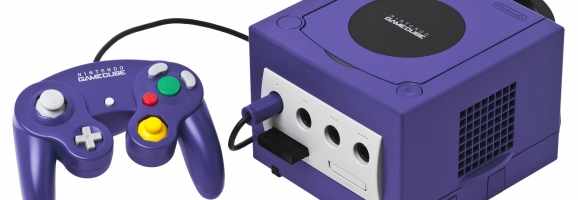
E3 is just around the corner, and Nintendo fans will no doubt be waiting nervously to see what games the company will reveal. This year feels like it will be more important than most for Nintendo, though – with recent figures showing that Wii U sales have all but ground to a halt, Nintendo, a company whose main value lies in its many critically-acclaimed game franchises, needs to show that it has the software ideas to keep the console afloat.
But will a Zelda reveal and more information on Super Smash Bros. really do much to help the Wii U? It has already had three Super Mario Bros. games and a Mario Kart game, franchises that saved the 3DS from doom in 2011, but they haven’t been able to bring the Wii U’s sales anywhere near to those of its handheld counterpart. The truth is that the name of a game alone is not enough to fire up interest, but it often feels like that is what Nintendo is shooting for more than anything else these days – games that strive to evoke fond memories of a series rather than truly push it forward.
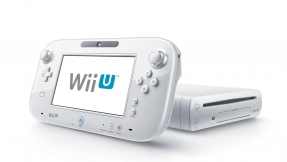
Some of the Wii U’s tent-pole games so far have included Donkey Kong Country: Tropical Freeze – a continuation of a SNES-era series with very similar gameplay – a re-release of The Legend of Zelda: The Wind Waker and two games from the New Super Mario Bros. series, which act as direct homages to classic 2D Mario games. New Super Mario Bros. 2 on the 3DS, released shortly after one of the Wii U games, received unusually lukewarm reviews for the series, which are probably best summed up by Joystiq’s comments on it – “Every Super Mario Bros. game used to define the rules; now I find the development team at Nintendo merely adhering to them”.
The Wii U has as many innovative features as its successful predecessor, but it also has many other problems that have proven that this simply isn’t enough – its branding doesn’t clearly differentiate it from the Wii, it lacks third-party support and it has quickly been outpaced in power by its competitors. However, a lack of compelling games from Nintendo itself should be the company’s chief concern. With reportedly over 800 billion yen in the bank from past successes, Nintendo can actually suffer the Wii U failing and live to fight another day. But any future consoles from the company will also falter, regardless of how the console itself innovates, if people get bored of its games, which are consistently critically and commercially successful and what Nintendo is known for more than anything else.
If there is one console they should be looking to for inspiration on how to make their games exciting again, it is arguably their most underrated effort – the GameCube.
The GameCube had many of the same difficulties as the Wii U – compared to its contemporaries the PS2 and the Xbox, it had a more juvenile image, fewer third-party games and lower performance. However, despite this, the GameCube contains some of the most interesting (and therefore, in many cases, best) entries in Nintendo’s flagship gaming franchises, making it a much beloved console among Nintendo fans.
These games all seem to come from a time when Nintendo was riskier, more creative and less concerned with what fans thought they wanted. They relied less on nostalgia and more on taking experiences players loved and showing them ways to make them love them even more. Perhaps they were scared off this sort of thinking by the relative failure of the GameCube, but that failure was not for a lack of quality games on the system. Today’s Nintendo could learn a lot from the GameCube era, and in the process start making games that people will really want to talk about again.
Super Mario Sunshine
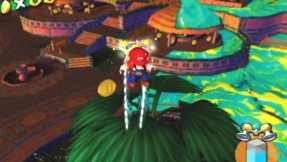
Nintendo resisted what must have been a very big temptation to produce a direct sequel to the influential Super Mario 64, instead opting to make Mario’s only major platformer on the GameCube something a little bit different.
Super Mario Sunshine mostly ditches the traditional abstract Mario worlds in favour of ones based on (slightly) more realistic locations. Levels set in areas like a hotel, a theme park, or a harbour all forgo the normal cues of Mario games (brown blocks need to be broken, mushroom platforms mean death if missed, etc.) to force the players to really think about how Mario interacts with his environment again.
In addition, Sunshine gives Mario new ways to move around these spaces. The FLUDD device strapped to Mario’s back allows him to spray enemies with water to hurt them, float in the air for a shot amount of time, do super-high jumps, or speed across water and up walls. As Mario games are essentially all about movement and how to best navigate 2D or 3D spaces, these changes are more significant than they first appear. 2013’s Super Mario 3D World may have won praise for the variety and ingenuity of its level design, but it still follows the classic Mario rule that jumping can solve almost any problem. Sunshine forces players to rethink that while still retaining the essential philosophy of challenge through movement that defines Mario’s gameplay.
Metroid Prime
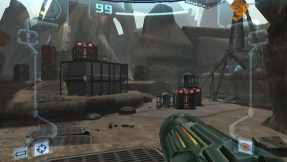
Unlike Zelda and Mario, Metroid missed out on a ground-breaking 3D update during the Nintendo 64 era. This is perhaps understandable considering how much more complex its gameplay actually is than its sister franchises. Metroid features vast exploration, accurate shooting, tight platforming and a varied character moveset, and getting all of these working and complementing each other in 3D can’t be easy. Considering this, it’s a true testament to the skills of the then-new Retro Studios that they managed to pull it off.
Metroid Prime’s big change to the series is its first-person viewpoint. At first this would seem to be anathema to a series that had always been third-person up until that point, but it actually fits Metroid perfectly. With the ability to observe the entire 3D environment at ease, Metroid’s complex level design can remain intact. Meanwhile, the shooting has the benefits of first-person shooter mechanics to remain as action and skill-focused as ever. Finally, the series’ trademark haunting atmosphere is made even more vivid by putting players right behind Samus’s visor – the HUD is deliberately designed to look like the inside of a helmet – and also helped by inclusion of the lore-uncovering Scan Visor and brilliant environment design by Retro.
It might have been a long time coming, but on the GameCube Metroid finally proved that it too could redefine genre expectations – this time showing that action-adventure games could work excellently in 3D and that first person shooters are capable of being much more than linear shooting galleries.
Mario Kart Double Dash
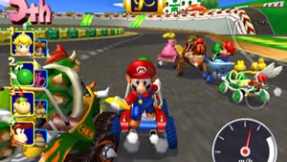
Most recent Mario Kart games have added new tricks to the series’ formula, but although things like underwater, anti-gravity and gliding sections may look fancy they don’t actually change much about how players control their kart. Nintendo’s unwillingness to disturb Mario Kart’s incredibly popular gameplay also means that these sections are usually very short and therefore have little overall impact on the racetracks, which by and large follow the familiar Mario Kart style no matter the game.
Nintendo’s greatest deviation from the Mario Kart formula arguably came with the GameCube’s Double Dash. Unlike later games, though, Double Dash applied most of its ideas only to the karts themselves, allowing the endlessly fun driving mechanics that made Mario Kart a success to remain intact while the new ideas could still make the game feel fresh.
The karts now seat two characters – one driving, one using items. These can be swapped around during the race to take advantage of their differing special powers or keep items they hold in reserve. This not only adds a degree of customisation to your character selection, but also an added layer of strategy in-game. Do you use your speed-boosting mushrooms now, or do you keep them in reserve and see if the other character can get his or her special ability? This becomes even more interesting when you play in co-op mode, where one player controls the driver character and the other player controls the item thrower. This leads to a series-high total of sixteen possible players in a match and one of the only multiplayer racing games which allows two people to drive one car.
Since Double Dash, Mario Kart has stuck to one character per kart, and while it’s easy to enjoy the simplicity this brings to races it’s always good to go back to Double Dash once in a while to mix things up.
The Legend of Zelda: The Wind Waker
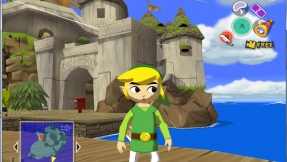
The Legend of Zelda: The Wind Waker was unbelievably controversial upon its reveal, but not because of the gameplay. In fact, Wind Waker hardly deviates at all from the magic 3D Zelda formula set in stone by Ocarina of Time five years earlier. Instead, it was its graphics that caused a backlash. The decision to use a cartoony ‘cel-shaded’ style rather than the more ‘realistic’ graphics that people were used to from the Nintendo 64 games meant that many fans felt the series was trying too hard to appeal to a younger audience.
These criticisms were almost immediately forgotten upon release. Wind Waker’s cel-shaded graphics were not only gorgeous, defying the technology of the time and still looking amazing today, but added a depth of character to the game that previous Zelda games had been unable to muster.
What this resulted in was a Zelda game that sucked you into its world like never before. The simplistic but expressive style of the graphics allowed a coherence in the look of the world that never broke your suspension of disbelief, and their ability to bring out the personality of even most minor NPCs helped Wind Waker support one of the best stories of any Zelda game, full of plot twists and memorable characters. Player character Link is a particular delight to watch, as his faces changes from curiosity to fear and determination based on what the player is doing.
Nintendo, though, was obviously scared off by the initial backlash and used a more ‘realistic’ style for 2006’s Twilight Princess. It’s telling, though, that 2011’s Skyward Sword returned to a more cartoony approach and that Wind Waker became the first HD Zelda game thanks to a Wii U re-release in 2013. It’s perhaps a sign that fans should learn to trust Nintendo more and not worry too much if a new game doesn’t match their classic expectations, and a sign that Nintendo should worry less about these expectations anyway.
Conclusion
Star Fox Assault, Kirby Air Ride and Donkey Kong Jungle Beat are other examples of GameCube games that took popular Nintendo franchises and shook them up, showing how widespread this kind of creativity was during the GameCube era. However, all of these changes to classic franchises are actually fairly minor ones in the greater context of their series– Metroid still retained all of its essential elements when it moved to first person; Mario might have jumped differently in Sunshine but he still mainly jumped.
That, though, is the point. Innovation does not have to be grand changes like adding a new controller (which often only results in inputting the same old commands in a different way) or changing the genre of a series completely (which can easily ignore what made that series good in the first place). Instead, small tweaks can change how gamers view a series that they have become overly familiar with. Recent Mario and Zelda games have a tendency to send players into a robotic state – from past experience with the franchise they’ll know exactly what to expect of them, what they have to do and when they have to do it. Changing up the familiar can make gamers view these games from a different angle and often remind them what made them fall in love with a series in the first place.
The Gamecube as a console may not have sold too well (although the Wii U still hasn’t beaten it), but its games are remembered as being among the most exciting of any Nintendo generation. Nintendo needs people to feel this excitement about Nintendo as a brand again to secure a future for the company even in the face of the Wii U’s failure, and if it is willing to be a bit riskier in its game development that shouldn’t be too hard. Nintendo can afford to lose money on the Wii U, but it can’t afford to have people losing interest in its games.
What do you think? Leave a comment.











Very interesting read. Even with the games that weren’t personally to my tastes (Metroid), I could appreciated the fact that they attempted something new. I really hope they try and do the same again now because I really don’t have many games for my Wii U, mainly down to not being enthused by any of them. Here’s hoping they strive for more because I really don’t want to play another game like Donkey Konga!
I hadn’t really imagined that there were such positive conceptions of the GameCube. I owned one myself, but had I been able to afford it, I likely would have gone with a PS2 or Xbox, as I had begun to find Nintendo’s library of games growing stale since the N64. Aside from the gems from the Mario and Zelda franchises, plus a couple of others, I really just wasn’t feeling it.
Nintendo has led the industry nearly since its inception, aside from the down periods it’s seen in the past few decades, and I would very much like to see it return to form. I’ve always considered them the company most dedicated to creating fun over building profits, and it would be a shame for the industry to lose that.
The Gamecube definitely benefits from hindsight. At the time the Xbox and PS2 always seemed like more exciting prospects, but I feel like the Gamecube has far more games that are memorable and still stand up today.
Nintendo could have used their Wii monopoly money to make something amazing instead they made the stupidly named Wii U and the rest is history. God luck Wii U console you need it.
people want the same games Nintendo has always made. we just need them sooner to save this system. if they would pump out the games like they did for their previous consoles, the wii u could be saved.
It’s a difficult balance for them to strike. If they don’t produce more games soon people will stop caring about the Wii U altogether, but if they rush them they might suffer in quality and people will stop caring about the games themselves.
I feel the same way. People love Nintendo, we just hate they’re not giving us what we love about them. Nintendo is withholding the love, lol.
Agreed! And my god I wish they would make a new Pokemon Snap!!!
I believe that I could manage Nintendo into profit better than the executives that they seem to be putting in place.
Anyone remember playing Metroid Prime for the first time? Pure joy… If they announce a new Metroid game……..
They’re crazy to keep such an acclaimed series dormant for so long, particularly when it’s one of their few franchises that really caters to older audiences!
I remember that joy coming from Super Metroid… Prime was good, too, but not as good as Super Metroid (relative for it’s time, not comparing graphics)
I never got around to playing super metroid. Maybe that’s why Prime was such a NEW experience for me. Lol.
It is possible that some Japanese developers might start developing games for the Wii U considering that the power is closer too last gen than current gen. The reason why is because it would require less effort to make the games.
Nintendo single-handedly saved the gaming industry after the North American Video Game Crash of 1983, people are quick to forget that. Not only will Nintendo bounce back, they will thrive when people start to seek fun games with original concepts. I personally hold Nintendo dear to my heart, and the gaming industry wouldn’t be the same without them. Just like the fall of Sega it would be a tragedy for Nintendo to vanish. But that won’t happen because Nintendo has some of the most creative minds in the business working hard to give us consumers what we want. LONG LIVE NINTENDO!!!
Nintendo’s fanbase is far more dedicated than either Sony’s or Microsoft’s, and as long as they hold onto that it will be hard for them to fail completely!
What does 1983 have to do with today? Very little.
And Nintendo will never “vanish”. Their presence in the video game market is certainly shrinking since the Wii U is tanking, but they have enough money saved up to fail continuously for years or decades on end.
There will always be Nintendo. It’s just that it appears fewer and fewer people will be playing Nintendo games with each passing year.
Your post is nothing more than fanboy fantasies; the Nintendo you’re talking about died years ago. Now they’re just about cobbling annoying gimmicks into the cheapest possible hardware, to pad their profits.
“they will thrive when people start to seek fun games and original concepts” – are you saying that there are no fun games and original concepts on cellphones, tablets, and the rest of the consoles out theres? one would argue that there is more originality outside of Nintendo.. due to their countless of ports and sequels.
So many people who come over think it’s crazy that I still have my GameCube set up, plugged in, and play it often! But I’d never give up Eternal Darkness: Sanity’s Requiem. The player-engaging “sanity effects” are one of the coolest things I’ve ever seen on a game.
Eternal Darkness is my jam all the time.
The Wii U has and is releasing some of the best Nintendo games to have come out in over a decade. Nintendo gets an unnecessary amount of hate because they don’t support third party gaming as much as their competitors do, which is a negative. But they release the best first party games of their competitors hands down.
Nintendo should develop a sector for mature audiences and your right, “not rely on nostalgia…” so much in the future.
I think the greatest dilemma for me in the Nintendo-sphere, is to not see the beloved, Nintendo franchise, Pokemon really go, ‘cross-platform’. That would have helped them in the long run and diversify their clientele.
If Pokemon went cross-platform in a substantial way then the DS/3DS would tank. Pokemon is the only thing keeping the handheld market from being edged out by smartphones.
My first console system as a child was an Atari, my second? An NES. For over 20 years I’ve been a Nintendo fan, and my favorite system by far was the Game Cube. Nintendo really pushed the envelope with that system, from the design of the system to the reinvention of the games. Though I can’t say that I was a fan of Wind Waker (because I’m not-it’s my least favorite Zelda game) what they did with the Metroid series was phenomenal.
To your point about innovation with the Game Cube, the best example with the Wii was Super Mario Galaxy. Having to navigate 360 degrees of worlds really made the player have to think about how they moved and interacted with the environment more than any other game I’ve played.
The biggest hurdle for Nintendo, though, has always been the lack of third party games. If Nintendo wants to salvage the Wii U, or start looking towards their next console. The availability of third party games will need to be addressed. Personally, I don’t think that third party games are ever as good as what Nintendo produces, but the benefit is variety for the players.
Wind Waker seems to either be people’s most or least favourite Zelda game – but that polarisation is good, because it shows that Nintendo wasn’t afraid to risk alienating some fans by changing up the gameplay more than they usually would.
I’ve always defended the Gamecube and few people have been able to understand why. It’s like you said- the Gamecube brought new life into old franchises like Mario and LoZ and made those ideas new again. I think Nintendo probably has something much bigger planned for E3 than just the new LoZ and Smash Bros, especially since they’ve been able to largely avoid much attention leading up to the event. Maybe a new Metroid game?
What DOES piss me off is that Nintendo is already planning the next console already? Writing WiiU off as a failure? Why not try to give the fans that spent money on the Wii U their money’s worth? The Wii U is only about one year old!
This is very typical. The next console always starts development as soon as the current one is released. The wii started development in 2002. Wiiu will have plenty of support, don’t worry about it.
I used to be such a Nintendo fan boy, but those days are so done.
Wii U is the only next gen console because the competition is just slowly turning into PC’s. Don’t get me wrong I still plan on getting a PS4 in the future because I like the exclusives but I don’t have a reason to get one yet. My PS3 still has life in it but once they stop making games for it will definitely upgrade. Nintendo games are ALWAYS fun and in the end that’s what gaming is suppose to all about. The Wii U has a lot of compelling reasons to buy one down to the smallest detail but I guarantee you that if you try it that you will want to buy it.
It’s interesting how many PC gamers I’ve seen who have a Wii U because, like you said, it’s the one that’s most different from a PC. This is particularly true in terms of the multiplayer – the Wii U has much more splitscreen and party games than the Xbox One and PS4. I can see why it would attract PC gamers who otherwise have very few options when it comes to splitscreen. Maybe Nintendo should focus on this more in their marketing?
If Nintendo ever disappeared it would be a tragic hit to the gaming community. I feel like a part of the issue with the Wii U was how they went about promoting it. It wasn’t until recently that they started with commercials that explicitly stated that the Wii U was a “NEW CONSOLE” rather than an add-on to the Wii. I finally bought one a month or so ago and I’m totally satisfied with it.
At this point so many people bash nintendo and the Wii U, that it is unlikely they will make a decent come back this generation in America where it matters most. The Wii U is a console that differs from the PS4 and XBOX one in more ways than just graphics. People keep saying that the nintendo needs to make a console that is just like the others when they do not realize that doing so would erase what makes the Wii U so much fun to play. If it had better graphics and a non touch screen controller with the newest call of duty, would it be any better? I honestly think it is fine how it is, but peoples minds have already been so influenced by public medium that a recovery for the console is somewhat impossible at this point.
I think the greatest enemy for the WiiU is a lack of variety in its gaming genres and titles. I say this as a WiiU owner whose console has been gathering dust for a few months now…
You’re absolutely spot-on in comparing the GCN with the Wii U. My hope is similar: A desperate Nintendo will push its top franchise titles out with more risky and innovative gimmicks and gameplay hooks. At this point, shouldn’t we expect (and want) new versions of core franchises to come out every generation?
Mario Kart 8 has upped console sales by 666% in the UK (which certainly sounds great when they weren’t selling that much hardware to begin with…), so hopefully that’s a sign of consumer desire for flagship Nintendo titles, and they’ll finally get their act together at E3 and through the remainder of 2014.
Mario Kart’s success is certainly promising, but I worry that 666% isn’t as much as it sounds when sales were low to begin with. The next Zelda game will likely help a lot too – I just hope that its importance to the Wii U’s success doesn’t mean they play it safe with regards to gameplay.
I totally, agree with this article. Though, I was never part of the 64 generation, I did grow up with the GameCube, I was consumed with playing Sunshine and Double Dash. Believe me, no matter how fancy or high tech you make your operating systems, they become worthless unless you have some super fun games to play on them.
Speaking honestly I grew up a Sony kid and didn’t know much about Nintendo until the Wii. But getting a chance to go back play some of these classics….I didn’t really find them all that enjoyable, aside from the Zelda series. I wish that Nintendo would have more JRPGs on their system.
From the E3 presentation yesterday, it looks like Nintendo is heading in the right direction. All their games seemed like interesting new takes on old franchises with some really fun new IPs in the mix too (Splatoon looks fantastic). There was a surprisingly large focus on the GamePad too, which is nice to see.
I loved all of the games you listed and it seemed like Nintendo took the advice to heart. The Wii-U has been floundering but with Mario Kart 8 and a bunch of heavy-hitters coming up to the plate the Wii-U has chance to finally bounce back.
So true. I loved what you said about Wind Waker and that alone is enough to convince me that Nintendo knows what they’re doing, even if we don’t know they know. Personally, I loved Wind Waker and it’s a shame I never played Sunshine but Double Dash makes up. Their games were incredible on the Game Cube and it really is the console that proves just what Nintendo can do.
The Gamecube was definitely more of a risk taker in context to its console generation. Many of the Gamecube games both first and third party were either hit or miss but mostly original or a different take on things. It was nice to see that even though I wished they had put out more matured games but I’ll take what I can get.
One other thing that will allow the wii u and subsequent Nintendo consoles to do better and truly compete with Sony and Microsoft is third party support.Right now and at least going back to the Nintendo 64, The main selling of the Nintendo consoles have been the games that Nintendo have made themselves.The last major game that came from developers not owned by Nintendo or from Nintendo themselves was Goldeneye 007 (I’m pretty sure that Rare was not owned by Nintendo i may be wrong here)
Great article. I totally agree- it seems like there is something lost in the shuffle now. You picked the classics to discuss, thanks for the read!